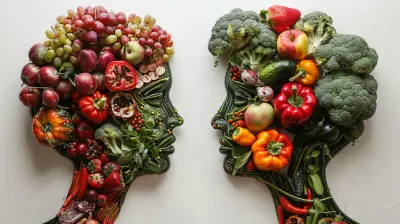How to Practice Self-Care Without Feeling Guilty
6 October 2025
Ever feel like taking time for yourself is almost... wrong? Like sneaking a cookie from the jar when no one's watching? You're not alone. In a world that glorifies hustle, self-sacrifice, and the grind, practicing self-care can sometimes feel like a rebellious act. And with rebellion often comes guilt. But here's the deal—self-care isn’t selfish. It’s survival.
If you’ve ever wrestled with guilt after saying “no,” taking a nap, or giving yourself a break—this one’s for you. Let’s dive deep (and I mean deep) into how to practice self-care without feeling like you’re abandoning the world, your responsibilities, or (gasp!) your inbox.
Why Do We Feel Guilty About Self-Care?
Let’s call out the elephant in the room: guilt. That nagging, whispery voice in your head saying, _“Shouldn’t you be doing something more productive?”_ That voice has roots. Deep ones.1. The Productivity Trap
Thanks to the rise of hustle culture, we've been taught to equate our worth with our output. If you’re not busy, you’re lazy, right? Not quite. Being constantly busy isn’t a badge of honor—it’s a ticking time bomb.Reality check: You are not a machine. You don’t need to earn rest. You just need it. Period.
2. The Caregiver Complex
Whether you're a parent, a partner, a boss, a friend—you probably take care of people. And it's beautiful. But somewhere along the line, taking care of others often replaces taking care of ourselves.Think of it this way—if your phone runs out of battery, it’s useless. If _you_ run dry, how can you keep powering everyone else?
3. Social Conditioning and Gender Expectations
Let's not sugarcoat it. Society sometimes sends the message that certain people—especially women—are expected to be constant nurturers. Always available. Perpetually giving. Putting your needs first can feel like a rebellion against decades (or centuries) of expectation.But isn’t it time you said “no thanks” to that outdated script?
What Is Self-Care Really?
It’s not all bubble baths and spa days (though yes, those can totally count). Self-care is any action that replenishes your energy, supports your well-being, and aligns with your values. Think of it as the foundation, not the frosting.Different Types of Self-Care
1. Physical – Sleep, exercise, nourishing food, long walks.2. Emotional – Letting yourself cry, journaling, therapy.
3. Mental – Reading books that challenge you, saying no to drama.
4. Spiritual – Meditation, nature, connecting with your purpose.
5. Social – Quality time with people who lift you up.
6. Professional – Setting boundaries, taking breaks, delegating tasks.
Self-care isn't about being selfish. It's about being human.
The Secret to Guilt-Free Self-Care? Reframing.
Let’s flip the script together. Guilt doesn’t usually mean you’re doing something wrong—it just means you’ve internalized a rule that no longer serves you. Time to redefine the rules.1. Think of It as Maintenance, Not Indulgence
You wouldn't feel guilty about refueling your car or charging your phone, right? Your mind and body work the same way. Self-care isn’t a luxury—it’s non-negotiable maintenance.2. Remember: You Teach People How to Treat You
Ever notice how, when you always say yes, people expect you to keep doing it? Setting boundaries isn’t pushing people away—it’s showing them how to respect your time and energy. You’re setting the tone.When you value your own well-being, others start to value it too.
3. Rewrite the Narrative
Try this mental exercise: Every time guilt creeps in, ask yourself, _“Who told me I wasn’t allowed to rest?”_ Often, the answer isn't even you. It's an outdated belief, a toxic culture, a stressed-out parent, or a pressure-filled job.Then respond with kindness: _“I’m allowed to take care of myself. I’m allowed to rest. I don’t need permission.”_
Real Self-Care Strategies That Don’t Trigger Guilt
Okay, enough theory. Let’s get our hands dirty. Here’s how to actually practice self-care in everyday life (without that guilt boomerang smacking you in the face).1. Start Small and Stay Consistent
Self-care doesn’t need to be grand. Start with five minutes. A morning stretch. A quiet cup of tea. A walk without your phone. When it becomes part of your routine, it starts to feel normal—not indulgent.2. Schedule It Like a Meeting
You wouldn’t cancel a meeting with your boss. So why do you cancel your meeting with yourself? Put self-care (yes, even naps) on your calendar. Treat it like a non-negotiable part of your day.3. Use the “Return on Energy” Rule
Ask yourself: _“Will this give me more energy or drain it?”_ If the answer is “more,” it’s self-care. Simple.Watching a Netflix series that makes you feel relaxed? Self-care. Scrolling Instagram while comparing yourself to everyone? Not so much.
4. Say No Without a Thesis Statement
You don’t need a TED Talk to justify saying no. A simple “I can’t right now” is enough. Guilt often creeps in when we over-explain. Keep it short. Keep it kind. Keep it firm.5. Flip the Empathy Switch—On Yourself
You show compassion to others. Use that same empathy on yourself. Would you scold a friend for needing a break? Nope. So why do it to yourself?When Guilt Still Shows Up (Because It Will)
Even with all the right strategies, guilt can still sneak in. Here’s what to do when it shows up uninvited:Notice It Without Judgment
Guilt isn’t your enemy. It’s a messenger. Instead of shutting it down, get curious: _“What is this guilt trying to tell me?”_ Often, it’s an outdated belief trying to protect you. Thank it for trying—and then choose a different path.Use Affirmations That Actually Work
Not every affirmation works for everyone. But try on a few like clothes and see which ones fit:- “Rest is productive.”
- “I can care for others and still care for myself.”
- “I’m worthy even when I’m not busy.”
- “Self-care is not selfish. It’s essential.”
Repeat them often. Especially on the hard days.
Phone a Friend… Who Gets It
Find your self-care soulmate. Someone you can text when you need a guilt reality check. Vent, share a meme, get reminded it’s okay to pause. Sometimes community = medicine.The Bigger Picture: Why Your Self-Care Matters to the World
Let’s zoom out. Taking care of yourself isn’t just about you. It creates a ripple effect.When you’re rested, your brain works better. Your heart opens wider. Your patience stretches farther. Your creative ideas come to life. You become a better parent, partner, leader, friend.
In fact, self-care might be the most radical form of activism there is. In a world that wants you burned out, staying well is an act of defiance.
A Final Word (Okay, Maybe a Few)
If you’ve made it this far, you already know this: you deserve to feel good. You deserve care, attention, rest, joy—without strings attached.There will always be unfinished work, unread emails, and people who need you. But you? You need you too.
So next time guilt knocks at the door while you’re soaking in a bath, out on a walk, or simply sitting in stillness—greet it, smile, and say, _“Not today.”_
Mini Self-Care Checklist (Guilt-Free Edition)
- [ ] Did I drink enough water today?- [ ] Have I breathed deeply in the last hour?
- [ ] Have I said no to something I didn’t want?
- [ ] Did I move my body in a way that feels good?
- [ ] Have I spent time with someone who lifts me up?
- [ ] Did I do something for joy, not productivity?
- [ ] Have I spoken kindly to myself?
You don’t have to check all the boxes every day. Progress, not perfection.
Remember: You Are Not a Machine
In a society that praises being "on" 24/7, choosing rest, joy, and personal peace isn’t just powerful—it’s revolutionary. You don’t have to prove your worth through exhaustion. You were already enough before the to-do list.You have permission to pause. No guilt required.
all images in this post were generated using AI tools
Category:
Mental HealthAuthor:

Paulina Sanders
Discussion
rate this article
1 comments
Nico Stewart
Self-care is essential, not selfish. Prioritize your well-being unapologetically; nurturing yourself enhances your ability to support others. Embrace guilt-free self-care as a vital practice.
October 26, 2025 at 4:01 AM

Paulina Sanders
Absolutely! Self-care strengthens us, enabling better support for others. Prioritizing our well-being is crucial and deserves to be embraced without guilt.


